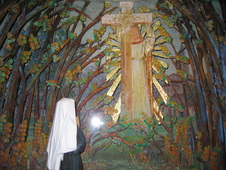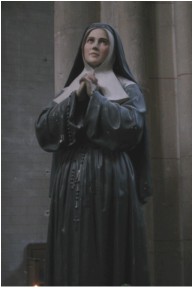How to Discern God's Call
The content of this discernment page was first created for the Imagine Sisters movement as a way to help young women discern a call to the consecrated life.
|
1/15/2013 0 Comments Ways to DiscernThrough prayer and the assistance of wise counsel, it seems to me that there are two primary ways that young women are discerning a vocation to the consecrated life these days. Both are effective and fruitful, but my experience tells me the second is the healthier approach most in line with the thinking of the Church.  1). The first way of discernment is often the most common, because it is intuitive: a young woman will spend time researching religious communities, eventually making a retreat, and finally making a leap of faith by joining a community or society, hoping that everything will work out. The young woman will usually say something like, “I don’t know which community I like most. There are too many to choose from.” And so she tries to narrow down the thousands of options by creating a list of criteria of what she likes about each one. Over time, the list slims and expands as she discerns which ones might work, only to stumble upon another option. In short: the first way of discernment focuses on selecting a community first, and self-understanding second. In my opinion, this way of discernment can be frustrating and overwhelming. A hundred years ago, when travel was minimal and options were limited to the convent in-town or the convent in-the-town-over, a girl could say “yes” more easily. Nowadays, endless options complicate discernment. Perhaps there is a more refined way…  2). The second way of discernment involves a good deal of reflection and self-understanding before discerning which community to join. Through prayer, a young woman discerns what “charism” the Lord has given her to share with the Church. Then she looks around for a community that shares the same charism, eventually attending retreats, and then making the leap of faith by entering as a postulant in order to further discern the charism. The Church believes that the Lord calls certain women from among the lay faithful to be icons of a particular virtue (charism) of Jesus. The Lord gives them a charism that grows in strength as they mature. And when the time is right, the Lord helps them find where that charism is to be lived out. A charism is a virtue about Jesus that the Father wishes to highlight for the sake of the Church: e.g., Jesus the prayer. Jesus the healer, Jesus the preacher, or Jesus in solidarity with the poor. Thus, someone discerning the consecrated life should be praying about what charism Jesus wishes her to highlight about who He is. If she is called to the consecrated life, the Lord will want to use her to tell the world about His Son. It is a little bit like picking up a book that someone else has already read and marked with a highlighter. We see what was highlighted and may find it inspiring, leading us to understand something in a more profound way. Likewise, when people see a Sister or Nun living out the mission God called her to, they may be inspired to think about the Lord in a more profound way. The Sister is a highlight of Jesus. For example, the Carmelites highlight holiness through interior prayer; the Benedictines highlight holiness through work and prayer; the Dominicans highlight holiness through preaching and teaching of the gospel; the Franciscans highlight holiness in poverty and the poor; etc. If a young woman feels drawn to spend all day praying for others, then she is likely experiencing a charism to join a contemplative community. If she feels drawn to be a teacher, then she may have a charism to teach. If she feels drawn to minister to the poor, then she may have a charism as a missionary. While she is discerning the charism, the young woman may begin looking at communities that have the same charism(s). There are thousands of communities throughout the world, so she will be able to narrow the list down to those that are like her. She should not be surprised that the Lord may have had her grow up not far from where that community or society is, nor that the Lord may ask her to move to another part of the country or world in order to be where He wants her. In short: the second way of discernment focuses on first identifying what charism God has given us, and then asking the question “Where does the Lord want me to go?” In my opinion, this is a healthier form of discernment. It recognizes that God has a specific calling for each of us. We do not need to randomly search for a place that will accept us. Instead, once we have a sense of who we are we can then look for a community that shares the same charism. When the Sisters talk about themselves and their way of life, in our heart we will be saying something like, “It feels like they are talking about me!” If that is the case, then the next step is to join them as a postulant, to live the charism with them. If we are to be somewhere else, the Lord will make His will known and provide the means to make it happen. God is the one who calls Again, the above ways of discernment are the ones I have found most common among those discerning consecrated life. Ultimately, God is the one who calls, so whatever means the Lord uses and whatever path we walk, if we are praying, God will get us there. No two vocation stories are alike, which should remind us that God knows how to tailor-fit our lives into His plan. Be not afraid to say YES!
0 Comments
1/15/2013 0 Comments Things to Keep in Mind Personal Prayer is Essential: The Lord speaks to us every day, and our conversation with Him will provide the answers to whatever questions may be on our soul. God is a communion of persons: Father, Son, and Holy Spirit. When we pray, we share in that relationship. It is why Jesus taught us to call His Father, “Our Father.” (Matt. 6:9) When we were baptized, we became adopted sons and daughters of the Father, brothers and sisters in Christ. (Jn 1:12, Rom 8:14-17) Often, all the Lord is waiting for is for us to call out to Him in faith. When we do, then we will not miss the Lord’s call. He will show us that we are lovable, we are loved by Him, there is a plan for us, and we can trust Him to bring it about at the right time. Seek Wise Counsel: God made us social beings; He wants us to help each other out. Asking the right questions of the right people is essential. “Be not afraid!” (Mt 14:27) “Put out into the deep.” (Luke 5:4) If holy people are hinting, or even teasing, that we should look at the consecrated life, then perhaps God is gently nudging our hearts in that direction. Having a spiritual director, or at minimum someone wise in the spiritual life to whom we can share our dreams and fears, is important. They often will be able to affirm where God has been active for us or offer some insight as to why something is amiss. Patience & Providence: God has a plan, but the timing is often the painful part of the process. Most of Jesus’ own life was quiet preparation. It was about thirty years of formation in Nazareth before Jesus stepped out into ministry. But when the ministry started, it was a fast-paced race to the finish. Likewise, we may spend months and years dreaming and thinking about being a Sister, and along the way it will feel like an eternity while the Lord sends subtle hints, arranges encounters, and forms us in virtue. Then, when all is ready and we have the sense that we are supposed to make the leap of faith, the process will come faster than we may be comfortable with. Lots of patience. Lots of trust. God has a plan, and grace will get us there. Pray and seek wise counsel. Beware Spiritual Warfare: We don’t like to admit it, but there are people and fallen angels that are not in favor of us joining Jesus’ team. They may try to dissuade, discourage, or even boldly block us from following the promptings of the Holy Spirit. As noted above, this is where personal prayer and wise counsel are important. The Evil One is not interested in us going on retreats. If we do go, he will try to steal graces away upon our return. So, as long as we know this in advance, we have nothing to fear. If God wants us to respond to a vocation call, and we are faithful, then all will come about at the right time. If we should falter, fear not, God can get us back on course. Holiness & the Sacraments: Our first vocation is to holiness. The simplest way to holiness is to go to Confession often and Eucharist as frequent as is possible. Spending time reflecting on how we can be perfected by grace, especially while adoring the Lord in the Blessed Sacrament, is a great way to understand God’s will for us. We can become saints before becoming sisters or wives, and this indeed is what God wants for us. The secret is to grow in love with Jesus and His bride, the Church. There are other important principles in the spiritual life not yet mentioned. The list above is a short introduction, so that a young woman can know she is generally on the right track. Do not be afraid to ask for help from those given to you by the Lord as wise counsel. 1/15/2013 0 Comments Discernment TerminologyBelow are some terms used amongst vocation directors and in Catholic circles when talking about vocation discernment.
A) Consecrated life: this covers all forms of religious life, including religious institutes, secular institutes, and societies of apostolic life, as well as consecrated virgins and hermits. B) Religious institutes: these are sisters and/or nuns that live in community and make solemn vows (also called final vows) to the evangelical virtues, e.g., Benedictines, Dominicans, and Franciscans. C) Secular institutes: these are sisters and/or nuns that may live alone and make solemn vows, e.g., Caritas Christi, Missionaries of the Kingship of Christ, and Institut Notre Dame de Vie. D) Societies of Apostolic Life: these are sisters that typically live in community and make simple promises or some other kind of bond, depending on the nature of the society. They are different from religious and secular institutes, insofar as they are more focused on the mission of their society rather than the institute itself, e.g., Society of Our Lady of the Most Holy Trinity (SOLT), Society of the Holy Child Jesus, and Society of the Catholic Apostolate (Pallotines). E) Sisters or Nuns? The term “nun” technically refers to sisters that live a cloistered life. In other words, nuns that live in the cloister usually do not step outside their convent or monastery unless health requires it. The term “sister” then, technically refers to sisters who are not cloistered. Both nuns and sisters are addressed as “Sister” when spoken to, but the terms are used when referring to what kind of community they belong to, e.g. “Those are the Poor Clare nuns that live at St. Francis Monastery.” And, “Hello, Sister Maria!” |
Fr. Aaron KuhnPriest of the Diocese of St. Cloud, MN. Ordained in 2007. Currently pastor of eight parishes in the Area Catholic Community of Mary, Mother of the Church. ArchivesCategoriesAll Apostolic Catholic Charism Consecrated Counsel Discernment Highlight Holiness Life Nun Nuns Patience Prayer Providence Religious Secular Sister Societies Society Vocation Wise |